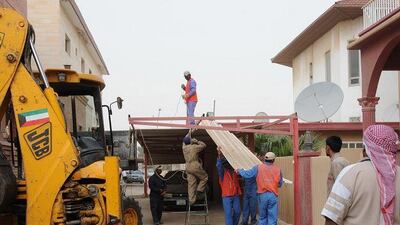KUWAIT CITY // Armed with diggers, welding kits and heavy-duty dump trucks, Kuwait's municipality is reclaiming the streets for pedestrians by tearing down more than 300,000 structures that have been built illegally on public land. For the past three years, seven teams on the committee for the removal of encroachments on state property have destroyed residential shacks, gardens and small buildings where men socialise. In the more extreme cases, the teams have filled in several luxury swimming pools. The encroachment issue made the front pages of the local press last week when Mohammed Hayef, an Islamist MP, filed a request to question the prime minister, Sheikh Nasser al Ahmad al Sabah, in parliament. Mr Hayef was outraged at the destruction of an unlicenced 30-year-old mosque. For the most part, however, the owners of the disputed property are nearby residents who annex pavements or alleyways by building on them. Residents who own illegal structures are given 15 days' warning. If they do not dismantle them, the municipality steps in. Two policemen accompany each demolition team to deal with problems that might arise. "Before, there were some big arguments. I tell my team: if anyone is screaming at you, don't talk with him; after two or three minutes he will calm down," said Mohammed al Dashti, a team leader of one of the municipality's removal squads. In the beginning, people thought the government would give up after a couple of months, so the owners resisted, Mr al Dashti said, but after seeing that the officers were serious and that residents were treated equally, "they slowly accepted it". Mr al Dashti's team removes up to 50 encroachments every day, and he expects to be doing the same job for at least another year. "We co-operate with the people. We remove the encroachments in a good way - politely," he said. One of the most contentious issues is the demolition of 30,000 illegally built diwans, where men relax, smoke shisha and play cards. Many Kuwaitis consider these meeting places to be at the heart of local culture, and they can be valuable properties, too. It is not unknown for a local to spend 50,000 dinars (Dh624,000) on a lounge to entertain guests. Despite their objections, the majority of lounge owners have co-operated with the removal teams, Mr al Dashti said. "After we gave out letters, 95 per cent of the owners removed them themselves." In the case of Mr Hayef, the MP, his application to question the prime minister was the third in the space of a week, adding to the country's political crisis. This was the first time the prime minister has faced multiple requests to face MPs in parliament. Many people believe the emir will dissolve parliament or accept resignation of the cabinet rather than see a prominent member of the royal family berated in public. The cabinet quickly voiced its support for the municipality. Faisal al Hajji Bukhadhour, the deputy prime minister, said last week there was no need for the mosque, which was demolished six months ago, as there is a much more modern and spacious one nearby. The mosque, which had not been a place of worship for years, was used as a warehouse for construction materials, he said. Kuwait's parliament is filled with MPs who zone in on religious issues, and some believe the illegal mosque should not have been touched. Other Islamist MPs have criticised Mr Hayef's stance. He should not have asked if he could question the prime minister over this issue, said Mohammed al Kandar, an MP with the Islamist Salafi Alliance. "I think it is the responsibility of the ministry of awqaf [and Islamic Affairs]. It's related to them more than anyone else." Civic groups have also criticised the move to quiz the prime minister. The chairwoman of Kuwait Economic Society, Rola al Dashti, said: "This is dangerous: trying to impeach a prime minister because he's employing a law. "I think this is a huge misuse of the role and power entrusted to MPs. "Anything wrong, irrespective of what it is, has to be fixed by the rule of law," Ms al Dashti said. "You don't use the religious sympathy of people and abuse it." Government needs to ease the ownership of the land, she said, not just to build gardens or diwans, but to bring down property prices and encourage development. In Kuwait the government owns almost 90 per cent of the land, she said. Most locals have now accepted that the demolition teams scouring the country are there to apply the law for everybody, and will rip up illegal structures regardless of who owns them. "When you apply the law across the board, nobody complains. "People complain when it's applied to me, the small person who doesn't have connections, and you forgive the connected and the powerful people," Ms al Dashti said.
jcalderwood@thenational.ae

